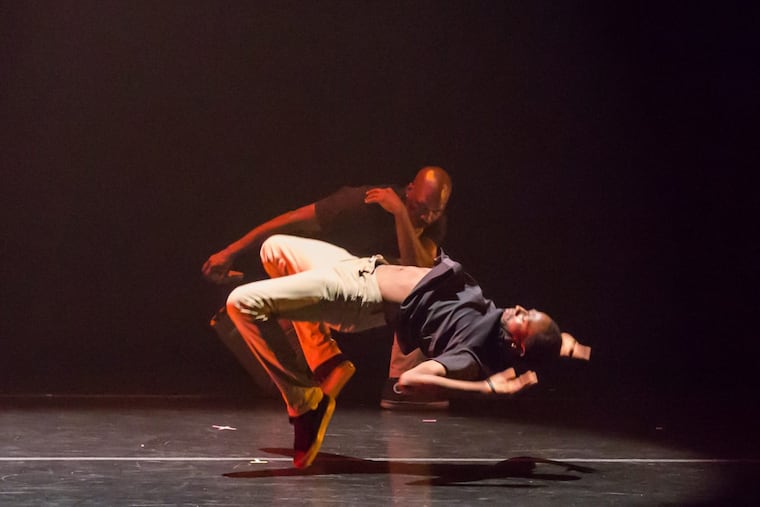A hip-hopper's progress, from Pulsations to Princeton … and now Annenberg
Dancer and choreographer Raphael Xavier started out in clubs, came up with Rennie Harris Puremovement, and brings his own company to University City for performances this weekend.

When Raphael Xavier, 46, was growing up in Wilmington in the '80s, he knew he'd get kicked out of school if he got caught break-dancing there. He did it anyway.
From junior high through his 20s, he practiced hip-hop whenever, wherever he could. More than three decades later, despite the street genre's physically punishing moves, he's still doing it.
Perseverance has paid off. The Southwest Philadelphia resident has earned Pew, Guggenheim, and MacDowell fellowships and is a guest lecturer of dance at Princeton University. He recently served as assistant choreographer to director Bill T. Jones for the Opera Philadelphia production We Shall Not Be Moved.
He's also branched out: into rap, photography, poetry, painting, and musical composition — elements he often combines on stage. Friday and Saturday at the Annenberg Center, Xavier will lead his five-dancer ensemble in three performances of his autobiographical repertory work, Point of Interest. At the same time, the center's lobby will display his slow-shutter-speed photographs of dancers.
Xavier talks about coming up in secret, back-in the-day clubbing — Pulsations, anyone? — teaming up with Philly's Rennie Harris, and what it feels like to break into middle age.
You've been dancing most of your life. How did you start?
I was just super-attracted to it. I watched the dance shows. We'd listen to Planet Patrol, Soulsonic Force — anything that had an electronic sound.
But you weren't allowed to dance in school?
Back [in the early 1980s], hip-hop was brand-new. Everybody was doing it. It was a YOYO [you're on your own]. But then around '85, maybe '84, a kid got hurt dancing in a mall in California, his parents sued, and everybody became afraid of a lawsuit. At my junior high school, if you were caught doing it, you were expelled.
So, where did you dance?
We hid in parts of the school hallway where we knew the doors were locked, at an end of the building. We could tell when someone was coming because teachers wore keys that made noise on their hips.
Outside of that, we'd practice at home, or at friends' houses. I was a wrestler, and when we would pull the mats out for practice, I would start doing it on the mats. I was like, "Look at this big, empty space — why not?"
I worked at a grocery store and would dance in the stockroom after hours, or in the aisle when I was stocking shelves. Wherever I could do it, I would.
When did you start dancing in public?
When I was 25, 26, a friend started taking me to clubs. I didn't drink. We'd go to Pulsations, which was predominantly a house club, just over the state line [in Glen Mills]. Every once in a while, they would play [Afrika Bambaataa & the Soulsonic Force's] "Planet Rock," the floor would open up, a giant spaceship would come down from the ceiling, and a big circle would light up, and I was like, "Oh, I know what to do now." Then, when the song was over, people in the club would be like, "OK, OK. This is not high school." We'd stop dancing.
So, hip-hop wasn't popular then?
Not until MTV came out with a show called The Grind. They featured the Rock Steady Crew. Next time I went to the club, people were trying to break. They were 18, 19 years old — they hardly knew about breaking. I was 10, 12, 13 years ahead of them.
One night, [the dance company] Rennie Harris Puremovement was there, and this group of seven guys jumped in the circle. My mouth dropped. I made friends with Cricket [James Colter] from Puremovement. He said Rennie was having an audition for a hip-hop version of Romeo and Juliet. At first, I was like, "That's stupid." I'm a purist. But eventually I went to the audition, and Rennie was like, "Get in where you fit in." I went to the breaker side.
How was performing professionally?
When I saw how the piece was put together and what it made me feel like, I was inspired to start putting all my artistic ideas into play. The first time I was ever on stage was 1998 with Rome and Jules at the Wilma Theater.
And you're still pulling off the street moves all these years later?
When I was with Puremovement, we were doing this whiz-bang show — all the bells and whistles. We did 55 shows in 60 days. We had this piece that was popping, locking, stepping, breaking. The breaking section was all power: All the breakers would just spin. We were wrapped up like mummies under our clothes. My thighs were torn up. My elbows, my joints were super-sore.
That's what inspired me to develop the kind of work I do now. I can't keep spinning all day. I have to be smart about it. After audiences see all the power stuff, I ask myself, "What can I do to make the non-power dance interesting? How can I keep moving?"
What do you do?
For Point of Interest, I've put my poetry in it, and some of the music that I've made. It's not just the choreography. That fulfills me. I also keep moving. When I stop, I notice it. Once you stop moving, everything hurts.
Point of Interest
Performances noon Friday (student performance), and 2 p.m. & 8 p.m. Saturday at the Annenberg Center for the Performing Arts, 3680 Walnut St.
Tickets: $30.
Information: 215-898-3900 or annenbergcenter.org.